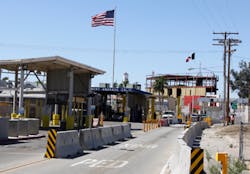Five ways 3PLs can ease cross-border shipping challenges
Cross-border freight shipping can be complex and challenging for businesses that want to move goods across international borders. Many logistical and regulatory issues exist, such as customs requirements, documentation, and border security. To navigate these challenges, many businesses turn to third-party logistics providers (3PLs) for help.
Maneuvering through the North American supply chain is a complex endeavor considering the vast enormity of obstacles like a global pandemic, a silver tsunami, and extensive truck driver turnover rates. Despite these obstacles and consequent bottlenecks, cross-border shipping will only increase among the U.S., Mexico, and Canada.
However, regardless of economic events and shifts like inflation, shipping across the U.S.-Mexico border is expected to increase in the near future, thanks to the recent nearshoring phenomenon. From management software to 3PL warehousing and everything in between, supply chain management is understandably difficult for enterprises to helm in-house.
See also: 'Just getting warmed up': Phillips expands operations in Mexico
When it comes to cross-border logistics, 3PLs can be particularly helpful. Here are five ways that they can assist with cross-border shipping needs:
1. Customs compliance
This can include owning or working with a trusted customs brokerage responsible for preparing and submitting the necessary paperwork to customs authorities, coordinating inspections, and other required procedures regarding cross-border logistics operations. Failure to comply with these requirements can result in hefty fines and stagnant inventory that lingers in customs limbo–failing to reach end destinations and causing significant financial burdens.
2. Carrier management
Another challenge of moving cross-border freight is finding reliable carriers to transport goods across international borders. For example, 3PLs can help businesses find and vet carriers that have the necessary licenses, insurance, and experience to transport goods safely and efficiently.
They can also negotiate rates and other terms with carriers on behalf of their clients, ensuring that they get the best possible service at a reasonable price. These cost savings can be significant with a partner who knows the ins and outs of cross-border freight logistics.
3. Freight consolidation
When shipping goods across borders, it can be more cost-effective to consolidate multiple shipments into a single container. This can be challenging to coordinate as it requires finding other businesses shipping goods to the same destination. 3PLs can help identify additional freight heading to the same destination and facilitate the consolidation of these shipments. This can save shippers money on shipping costs and reduce their overall carbon footprint.
4. Risk management
Cross-border freight can be risky, as goods are often in transit for long periods and are subject to various risks—such as theft, damage, and delays. 3PLs can help shippers manage these risks by providing insurance coverage and utilizing trained staff to mitigate potential problems. For example, they can use real-time tracking systems to monitor the movement of goods and intervene if there are any issues.
Additionally, the right 3PL will have an extensive background of cross-border logistics experience, and this experience ensures expertise in risk management. Having strategically located facilities and a keen understanding of all regulatory requirements allows 3PLs to react to any challenges accordingly with multiple solutions if problems arise during transit.
5. Supply chain visibility
Another benefit of using a 3PL provider for cross-border freight is increased visibility into the supply chain. 3PLs can provide shippers with real-time updates on the location and status of their shipments, as well as other key performance indicators such as transit time and delivery accuracy.
This information can help shippers make more informed decisions about their supply chain, such as when to reorder inventory or adjust production schedules. Increased visibility accompanies a plethora of business advantages like cost savings in areas such as shipping costs and order fulfillment.
Subscribe to FleetOwner Newsline, our daily updates on the trucking industry.
Let the Experts Help with Cross-Border Logistics
Overall, 3PLs can be a valuable resource for shippers moving goods across international borders. They can help shippers manage complex customs regulations, find reliable carriers, consolidate shipments, mitigate risks, and provide supply chain visibility.
Supply chain management is made easy by these experts. They can help with logistical challenges like shipping costs, order fulfillment, cross-docking, and warehousing. Consider outsourcing cross-border logistics to those whose careers are devoted to constantly improving their knowledge and expertise in the field so you can shift your focus to improving internal business operations.
By partnering with an accomplished 3PL provider, shippers can shift the focus back to their core competencies. For those searching for more efficient and cost-effective cross-border freight operations and a better overall customer experience, connect with a superior 3PL provider today.
Andrew Welling is the vice president and general manager of brokerage operations at TA Services, with nearly a decade of transportation management experience including shipping, transloading, consolidation, 3PL, and international logistics. Andrew earned his graduate degree in business administration and his undergrad in supply chain management and international studies.
About the Author
Andrew Welling
VP and GM of brokerage operations for TA Services
Andrew Welling is VP and general manager of brokerage operations at TA Services. Previously, Welling worked with ProTrans as director of capacity management and carrier utilization and with Knauf Insulation North America as transportation manager.

